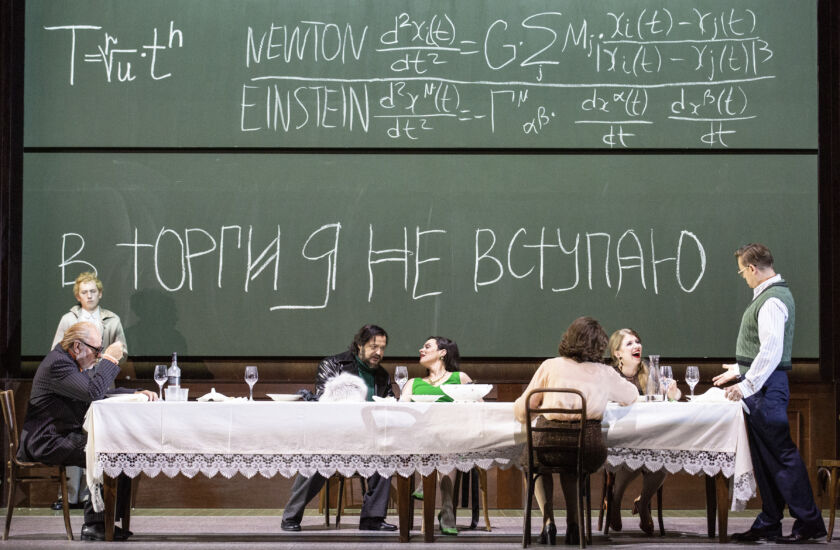About the Production: The Idiot
„Weinberg has become a true passion for life.“

A prince returning to Russia who is ridiculed as an “idiot” because he believes in human goodness in the midst of a brutal and hypocritical society, encountering everyone without guile, but with compassion and love; and a young private tutor in “Roulettenburg”, for whom money and its acquisition become a fatal meaning of life: two figures from Dostoyevsky’s cosmos – one in quiet revolt and one a restless, driven character, both of whom hit the nerve of our time – will appear during the 2024 Festival summer in impressive musical settings by Mieczysław Weinberg and Sergey Prokofiev. In these interviews, conductor Mirga Gražinytė-Tyla and director Peter Sellars illuminate their approach to Weinberg, Prokofiev – and Dostoyevsky.
Despite his voluminous oeuvre, the Polish-Russian composer Mieczysław Weinberg has only found his way onto the radar of a broader audience very recently. You, Mirga Gražinytė-Tyla, played an important role in this development: you have often programmed works by Weinberg in your concerts; you have also recorded them, not least for your acclaimed debut album with Deutsche Grammophon. After The Passenger, you are now conducting another stage work by the composer, the Dostoyevsky opera The Idiot. How did you become the rediscoverer of Weinberg?
It was Gidon Kremer who brought Weinberg to my attention, more precisely the chamber symphonies the composer wrote in the last decade of his life, just like The Idiot. I found even these first Weinberg pieces I studied and performed uncommonly fascinating – it felt like an invitation to “keep digging”. Over the course of the following two or three years, I realized the incredibly amount of fantastic music Weinberg left us. After each new work of his that I studied and rehearsed, I was left with the feeling: I simply must return to Weinberg. By now, he has become a true passion for life.

How would you characterize The Idiot, the last of Weinberg’s six operas?
The Idiot is a huge work, and to the audience, there is probably a similarity to reading Dostoyevsky’s great novels: during the first fifty or one hundred pages, one tries to find some orientation amidst the onslaught of names, places and events; but gradually the strands of the story are interwoven more and more closely, and after that one hundredth page, the story develops such a pull that you just can’t stop reading anymore.
Weinberg’s Idiot begins with a short, memorable motif in triple forte, which I interpret as a motif of despair and which keeps recurring later. In principle, we encounter many of Wagner’s ideas in Weinberg’s work with motifs; his tendency towards repetition, however, is more akin to Richard Strauss: the music keeps developing continuously, and in this sense, the opera does resemble a novel. In the beginning, as the various characters and motifs are introduced, we listen and try to grasp how it all hangs together. The further the story advances, the more intensely we feel drawn in to it.
Even the preparation for our production feels happy and enriching to me; at the same time, I am aware that it will be a great challenge to pull this wealth of text, motifs and characters into one satisfying whole. However, I expect it to be like other works by Weinberg: first you have to conquer the “material”, for much of it is also virtuosic – sometimes that is the reason why Weinberg is not, or perhaps we should say: not yet, mentioned in the same breath as Shostakovich and Prokofiev. Once one has mastered the technical aspects, though, an in credibly personal world lies before us.
You just mentioned Shostakovich, a lifelong champion of Weinberg and his works. Do you see musical affinities between Shostakovich, to whose memory The Idiot is dedicated, and Weinberg?
Shostakovich’s influence is felt greatly throughout Weinberg’s entire oeuvre. As a young man in Warsaw, Weinberg’s first enthusiasm was for Impressionism. Fleeing the Nazis, he came to Minsk, where he studied and played in an academy performance of Shostakovich’s Fifth Symphony – he played the celesta and harp parts on the piano. This first encounter with Shostakovich’s music was like an initial spark. From then on, he saw this direction as the future of music. Later, Weinberg and Shostakovich became friends, showing one another their latest compositions and regularly playing four-hand piano together. Many aspects of Shostakovich’s style, of his complexity, polyphony, harmonics and orchestration, can be found in Weinberg’s work. On the other hand, Weinberg also influenced the older composer, for example when it came to using elements of Jewish folklore.
Given what I know and have encountered so far of both their works, I would say that Weinberg was perhaps the more quiet, shy, perhaps the humbler of the two. It is rare, almost impossible, to find grotesque or satirical notes in his works.
Incidentally, I can easily imagine that Weinberg gave his “Idiot”, Prince Myshkin, some of the characteristics of his friend Dmitri. At the same time, Weinberg’s own personality also certainly influenced this mysterious figure. Many of the wise sayings Myshkin offers us throughout the piece must have harmonized strongly with Weinberg’s character – for example the notion that beauty is not dead, but simply not highly esteemed by our present times.
Interview: Christian Arseni
Translation: Alexa Nieschlag
First published in the Festival insert of Salzburger Nachrichten 2024
